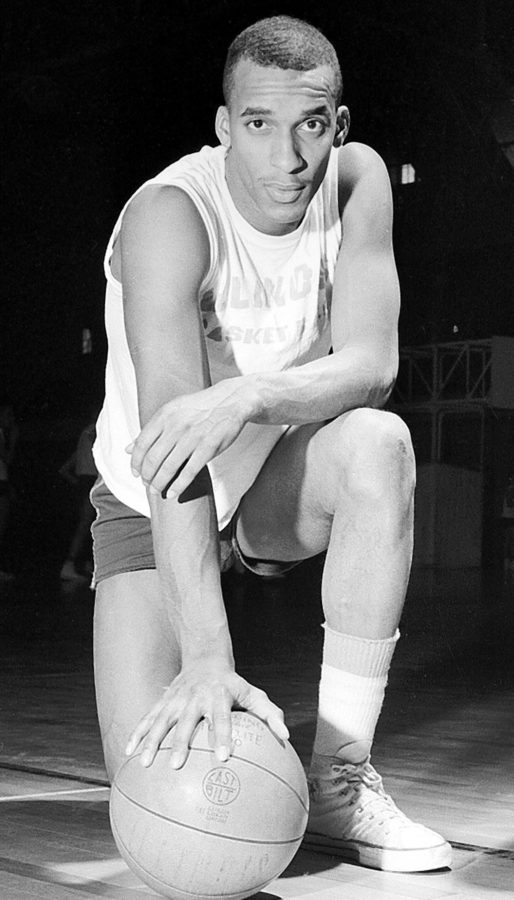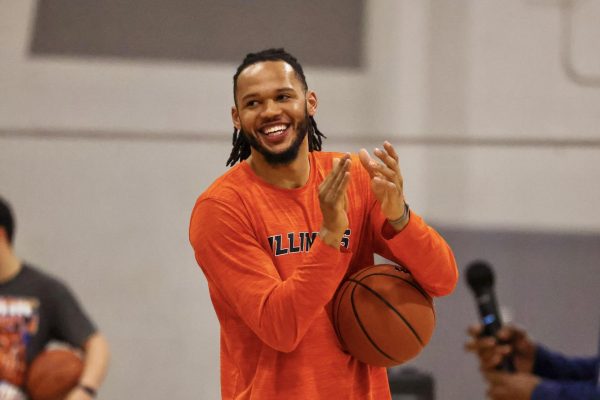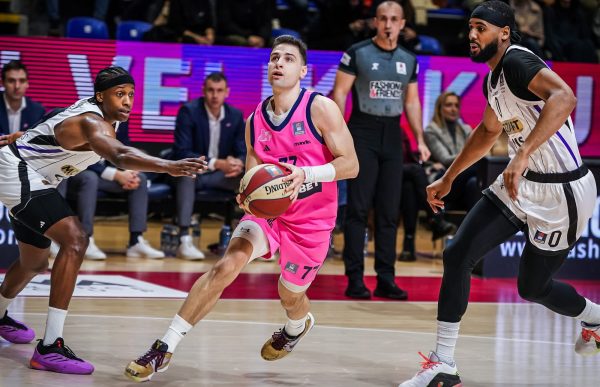Basketball: A saving grace for Illinois' Mannie Jackson
February 9, 2016
Editor’s note: Mannie Jackson and Dave Downey are two high-profile Illinois basketball alumni and donors to the University. They’ve made an impact in the record books, in the corporate world and in the lives of Illinois student-athletes with their donations.
Read on for Mannie Jackson’s story. Click here for Dave Downey’s story.
As Mannie Jackson would say, it started with the “gift of basketball.”
Jackson doesn’t mind admitting that he was a good basketball player — he’s known it for a while.
“My grandfather and father always thought of me as a winner,” said Jackson, a 1960 University alumnus who played for the Illini from 1957 to 1960. “But they, maybe my grandfather more than my dad, also said you set your own expectations and make sure they’re high. Don’t let anybody else set those expectations for you.”
Get The Daily Illini in your inbox!
Born in a boxcar in Missouri, his family moved when he was a young child to Edwardsville, Illinois. Jackson’s family still struggled, but had higher hopes for him — mainly that he find success in life.
Basketball would quickly become his ticket out.
***
Jackson resides in Phoenix and is the current president and chairman of Boxcar Holdings, named for his birthplace. Boxcar Holdings is a collection of business investments that include sports properties, real estate and other entertainment ventures.
He’s also the director and president of the Mannie Jackson Center for the Humanities, which opened in December as a unit of Lewis and Clark University in Edwardsville. The Center aims to promote cultural understanding and break racial and cultural barriers.
Jackson recently contributed a $3 million gift to the State Farm Center renovations to help fund the Mannie L. Jackson University of Illinois Basketball Hall of Fame.
Jackson’s own path to a retired Illini jersey started back when he, along with Governor Vaughn, became the first African-Americans to letter and start for the Illinois basketball team in the 1957-58 season.
In his senior year, he was a captain and All-American. After graduation, he tried out for the New York Knicks. He didn’t make the team, but a cross-town franchise was interested in his talents.
He was invited to try out for the Harlem Globetrotters.
He spent two years with the Globetrotters before earning his MBA from the University of Detroit in 1968 and entering the business world at Honeywell, Inc., a Fortune 100 company that specializes in aerospace advancements, transportation systems, technology and materials. Jackson remained at Honeywell for 24 years.
In 1993, Jackson acquired the Harlem Globetrotters for $6 million, becoming the first African-American to own a sports and entertainment organization. He turned around the nearly bankrupt organization and led the Globetrotters to revenue and renewed success.
Jackson took advantage of his opportunities, using basketball to differentiate himself from his peers and get an education.
“I think we all have some genius in us,” Jackson said. “Unfortunately for many people, it doesn’t get recognized, or they don’t have a chance to exploit it. My blessing was that I had the chance to do it. God knows they put up enough obstacles to make it happen.”
As one of Illinois’ first black starters, Jackson said he was lucky to not experience extreme prejudice compared to some of his friends at other colleges.
“I think there were (Illinois) coaches and teammates that, for in those times, were pretty unique,” Jackson said. “I have a hard time recalling any coach or teammate making a derogatory remark that would put a roadblock in front of the mission we had, which was to play the game of basketball and graduate.”
Jackson, who prides himself on being a leader, helped educate teammates on both basketball and life during his time at Illinois.
For Dave Downey, who was a freshman when Jackson was a senior, having a teammate like Jackson was crucial.
“Both (Jackson and Vaughn) helped me a great deal,” Downey said. “Not only at being a better player, but being a better person.”
***
Jackson said his donations to the University are a way of giving confidence to the next group of Illinois students and allowing the next leader, whatever his or her field, to emerge.
But it’s not only donations that have allowed Jackson to make an impact. When he’s in town, Jackson is often found speaking to current players in the Illinois’ basketball locker room or at head basketball coach John Groce’s house for team meals.
“He has such great insights because he doesn’t just talk to them about what it means to be a basketball player,” Groce said. “He wants them to understand what the University of Illinois can do for them long after they’re done playing basketball. And sometimes it’s hard for guys 18 to 22 to do that because they can’t see past the nose on the end of their face.
“But he really gives them perspective in that regard.”
It’s a perspective that has influenced past players like Dee Brown, standout on the 2005 National runner-up squad and a consensus All-American the same year. Brown played professionally both in the NBA and overseas before retiring in 2015 to take a position at Illinois as a special assistant to the director of athletics.
Jackson has become a mentor for Brown. Though Brown knew of Jackson when he was in school, the pair didn’t connect until both were in Italy: Jackson traveling with the Globetrotters and Brown playing overseas ball.
But it’s a friendship that has continued to grow. Brown reached out and talked to him when he took the Illinois position. He even traveled to Edwardsville to have dinner with Jackson after Brown returned to Champaign.
“That’s why I love the University of Illinois,” Brown said. “We’ve had great people come through here and I think whatever situation you’re in, you got to know the history of the people that laid the groundwork and foundations. For me, it’s great to see the success of people we’ve had at the University of Illinois. It motivates me to continue to get those kind of people.”
Whether it’s talking about basketball or life in general, Brown has been happy to have Jackson in “his corner.”
Jackson’s advice and donations have become a way to demonstrate being able to overcome tough situations. A way to encourage others to do the same. A way to say ‘thank you,’ for the foundation he had.
Giving back, he said, is the only life he knows.
cmcarro2@dailyillini.com
@charlottecrrll






